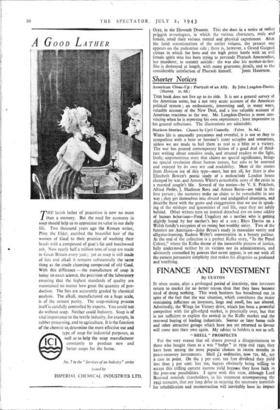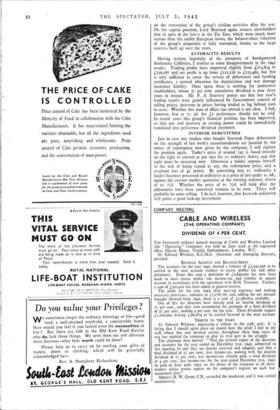FINANCE 'AND INVESTMENT
By CUSTOS
IT often seems, after a prolonged period of inactivity, that investors return to market for no better reason thasi that they have become tired of doing nothing. This week business has broadened out in spite of the fact that the war situation, which constitutes the major restraining influence on investors, large and small, has not altered. Admittedly, the Wings for. Victory drive, which has. been a powerful competitor with the gilt-edged market, is practically over, but that is not sufficient to explain the revival in the Kaffir market and ,the renewed buying of leading industrials. Sooner or later home rails and other attractive groups. which have not yet returned to favour will come into their own again. My advice to holders is not to sell.
" SHELL " PROSPECTS
For the very reason that oil shares proved a disappointment to those who bought them as a war " hedge" in 1939 and 1940, they have been among the most popular choices in recent months as peace-recovery investments. Shell £r ordinaries, now 7zs. 6d., are a case in point. On the 5 per cent. tax free dividend they yield less than 3 per cent. less tax, buyers obviously being willing to accept this trifling current income yield because they have faith in the post-war possibilities. I agree with this view, although Lord Bearsted reminds shareholders, in his statement accompanying the 1942 accounts, that any long delay in securing the necessary materials for rehabilituion and reconstruction will inevitably have its impact
on the restoration of the group's civilian activities after the war. On the capital position, Lord Bearsted again assures shareholders that in spite of the loss's in the Far East, which were much more serious than the earlier Eurcpean losses, the balance-sheet valuation of the group's properties is fully warranted, thanks to the large reserves built up over the years.
ANTHRACITE RESULTS
Having written hopefully of the prospects of Amalgamated Anthracite collieries, I confess to some disappointment in the 1942 results. Trading profits have improved slightly from £215,854 to £226,187 and- net profit is up from £111,128 to £125,462, but this is only sufficient to cover the service of debentures and funding certificates, a normal allocation for depreciation and war damage insurance liability. Once again there is nothing for preference stockholders, whose 34 per cent. cumulative dividend is now three years in arrears. Mr. F. A. Szarvasy points out that last year's trading results were greatly influenced by Government control of selling prices, increases in prices having tended to lag behind rises in costs. Whether this state of affairs has altered is not clear. I feel, however, that at 7s. 3d. the LI preferences should not be sold. In recent years this group's financial position has been improved, so that any real recovery in earning power could be immediately translated into preference dividend payments.
INVERESK DEBENTURES
Just in case any readers who bought Inveresk Paper debentures on the strength of last week's recommendation are puzzled by the notice of redemption now given by the company, I will explain the position again. Today's price of around 145 is based entirely on the right to convert at par into the is. ordinary shares, and this right must be exercised now. Otherwise a holder exposes himself to the risk of being repaid at 103, the redemption price,. and a resultant loss of '42 points. By converting into Is. ordinaries a holder becomes possessed of ordinaries at a price of just under is. 6d., against the current market quotation of the existing ordinary shares of Is. 71d. Whether the price of is. 71d. will hold after the debentures have been converted remains to be seen.. There will probably be some selling. I do feel, however, that Inveresk ordinaries will prove a good lock-up investment.



























 Previous page
Previous page